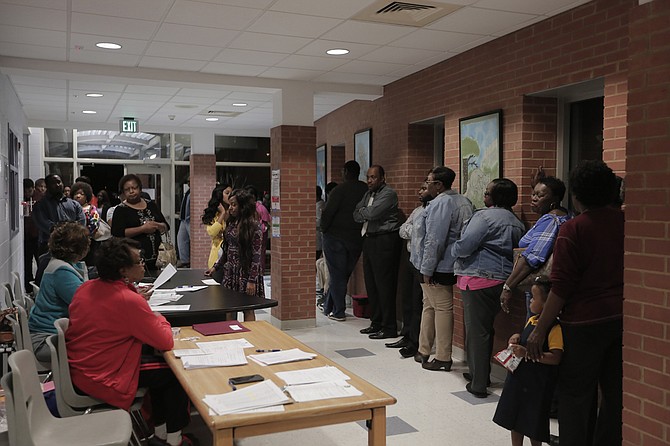Some Jackson voters, like the ones pictured here at the McWillie Elementary School polling precinct, waited in lines for up to 45 minutes to vote in the recent presidential election. Hinds County officials continue to tally up the voter affidavits and absentee votes, but the area went heavily for Clinton. Photo by Imani Khayyam.
JACKSON — Hinds County Election Commissioner Connie Cochran stands amid piles of papers, ballots and maps as workers comb through the boxes upon boxes of affidavit ballots that voters filled out during last Tuesday's general election.
"There's always problems, but basically we didn't have any major problems," Cochran said.
Cochran, who lost her seat in the election, said the county would not have an exact number, or all of the estimated 5,000 affidavit ballots read and verified, before the Nov. 18 deadline for the final results.
Affidavit Ballots to Count
Poll workers used affidavit ballots when the voter's name did not appear on their rolls if the voter believed that it was supposed to be his or her district.
At all precincts, Cochran said, poll workers were supposed to have scanned the voter's ID, if it was a driver's license. The license should have corresponded to the voter roll for the precinct.
If the voter used another form of ID, Cochran said, then the poll worker would manually look for the voter's name. In the case that neither option worked, the voter could file an affidavit ballot.
The county then reviews and confirms the veracity of the details on the affidavit ballot, and if the voter was actually supposed to be on that precinct's voter roll, the vote will count. For this reason, the commission does not have any way to tell how many of the possibly 5,000 votes it must add to the totals until after it verifies the affidavits.
"When you have humans involved, you are going to have issues," Cochran said of the ballots, which number in the thousands. "I have 833 in District 4. Some have hundreds, some have more."
"In 2008, there were more (affidavits) than this," Cochran said, adding that they did not expect the number of voters who went to the polls in Hinds County. "In the end, there was a driving force (to vote)."
Although Hinds County continues to count affidavit ballots as of press time, the preliminary results show a turnout of 62.93 percent of total registered voters (148,633) with Hillary Clinton winning 70.91 percent of the preliminary votes, 65,727, while Donald Trump received 26.77 percent, or 24,813 votes.
Leah Rupp Smith, press representative for the Mississippi secretary of state's office, said during a Nov. 10 interview that the counties are in charge of the voting machines and the polling places.
Smith also said that the State of Mississippi only closed or moved 68 polling locations since 2012. Today, Mississippi has 1,809 polling places across the state.
Her response comes on the heels of a 2016 Leadership Conference on Civil Rights study that outlines a trend among some states in the south for closing polling places since 2012. For example, the study outlines how several southern states, including Texas and Louisiana have closed polls now that, after a landmark Supreme Court ruling, the counties can change the locations without Department of Justice approval.
Scott Simpson, the author of the study, said during a Nov. 11 interview that Hinds County was one of the many holes in the information the federal government gathered after elections, mostly because his group collects information through voluntary surveys. So to track the most recent changes, the most authoritative source is Connie Cochran and the county.
Poll Closures in Hinds
Overall, Hinds County moved, merged or closed 14 polling locations in anticipation of the election, a list Cochran provided showed, ending with 110 locations for the county.
The secretary of state's office reports that Hinds had 120 polling places in 2012.
The reasons for the closings and mergers vary. The commission determined that three of the polling places were out of compliance with the Americans with Disabilities Act requires, a problem Cochran said is common in some of the older buildings. Five locations simply did not wish to host a polling location anymore.
"There are more precincts that are going to have to be closed," Cochran said. "We use so many schools, and they are not ADA compliant. Churches. And you can't make them be compliant, so the county bears the brunt."
Cochran said the Hinds County Board of Supervisors consistently tries to close polling places in order to save money on the cost of operations each year. She added, however, that public input usually serves to push back against this tendency.
As for voter confusion, she said voters should stay alert for mail from the county before elections.
"Every voter involved in a change is sent a voter card giving them updated information," Cochran said.
Email city/county reporter Tim Summers Jr. at [email protected].
More stories by this author
- DA Smith Wins on One Count, But Passes on 'Whistleblower' Bad Check Claims
- Mayor Yarber, Socrates Garrett Address Contracting Dispute, 'Steering'
- UPDATED: Jury Finds Allen Guilty for Cell-phone Payment, Not Guilty on Nine Counts
- Allen Trial: Defense Rests After Making Case DJP Doesn’t Collect 'Taxes’
- DJP Board Attorney Gibbs Takes Stand to Defend Ben Allen's Actions


